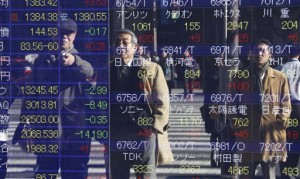
People are reflected on the electronic board of a securities firm in Tokyo Thursday, Dec. 13, 2012. Asian stock markets were mixed on Thursday as the US Federal Reserve announced fresh monetary easing and said it would not lift interest rates until unemployment was under control. AP PHOTO/KOJI SASAHARA
HONG KONG—Asian stock markets were mixed on Thursday as the US Federal Reserve announced fresh monetary easing and said it would not lift interest rates until unemployment was under control.
However, the head of the central bank Ben Bernanke said the looming fiscal cliff of huge tax hikes and deep spending cuts was already hitting the economy.
The yen continued its slide ahead of the weekend’s general election in Japan that is expected to see a victory for the opposition, whose leader has vowed to press for more aggressive measures to kickstart growth.
Tokyo climbed 1.68 percent, or 161.27, to an eight-month high of 9,742.73 as major exporters gained on the yen’s dip, Sydney ended flat, dipping 1.0 point to 4,582.8, and Seoul was up 1.38 percent or 27.33 points, at 2,002.77.
Hong Kong lost 0.26 percent, breaking a three-day rally that saw the market hit a 16-month high. The index eased 57.77 points to close at 22,445.58, while Shanghai fell 1.02 percent, or 21.25 points, to 2,061.48.
After a two-day meeting the policy committee of the US central bank said it would replace its “Operation Twist” bond swapping programme with $45 billion a month in straight bond buys, on an open-ended basis.
That comes on top of the $40 billion a month purchasing announced in September.
The Fed also provided a surprise by saying it would not lift rates as long as the inflation outlook was below 2.5 percent and the jobless rate, now at 7.7 percent, stays above 6.5 percent.
“The Fed’s decisions did not really surprise anyone, although its comments about expecting rates to remain very low as long as unemployment remains above 6.5 percent were somewhat novel,” said Hiroichi Nishi, general manager of equities at SMBC Nikko Securities.
“The bottom line is that it will continue its aggressive steps to foster economic growth,” he told Dow Jones Newswires.
However, the Fed’s announcement was followed by a warning by Bernanke that Washington needed to come to an agreement in their talks on avoiding the fiscal cliff, adding that the lack of action was already causing problems.
“Even though we have not even reached the point of the fiscal cliff potentially kicking in, it’s already affecting business investment and hiring decisions by creating uncertainty or creating pessimism,” he said at a news conference.
On Wall Street the Dow and S&P 500 ended flat, while the Nasdaq fell 0.28 percent, with earlier gains from the Fed announcement cut back by Bernanke’s comments.
On currency markets the yen remained under pressure as Sunday’s poll approaches, with Prime Minister Yoshihiko Noda’s Democratic Party of Japan likely to lose to the Liberal Democratic Party, which is headed by Shinzo Abe.
Abe, a former prime minister, has promised to push a more aggressive monetary easing policy to jumpstart the economy.
The dollar was changing hands at 82.520 yen in early European trade, from 83.24 yen in New York late Wednesday, while the euro was at 109.14 yen – near its highest in about nine months – from 108.85 yen. That compares with 82.85 yen and 107.48 yen earlier on Wednesday in Asia.
The euro bought $1.3021 against $1.3075.
Oil prices were lower. New York’s main contract, light sweet crude for delivery in January, fell 19 cents to $86.58 a barrel in the afternoon and Brent North Sea crude for January delivery shed 17 cents to $109.33.
Gold was at $1,695.60 at 1100 GMT compared with $1,713.22 late Wednesday.
In other markets:
— Taipei rose 0.87 percent, or 66.9 points, to 7,757.09.
Chip giant TSMC gained 0.81 percent to Tw$99.2 while smartphone maker HTC was 0.35 percent higher at Tw$285.0.
— Manila fell 0.55 percent, or 31.84 points, to 5,787.95.
Ayala Corp. lost 1.96 percent to 500 pesos, Philippine Long Distance Telephone eased 0.08 percent to 2,594 pesos and SM Investments fell 1.66 percent to 860.50 pesos.
— Wellington fell 0.51 percent, or 20.53 points, to 3,974.73.
Telecom eased 1.6 percent to NZ$2.16, Air New Zealand was down 2.9 percent to NZ$1.34 and Fletcher Building was up 0.12 percent at NZ$8.29.
— Kuala Lumpur rose 3.0 points, or 0.18 percent, to 1,652.75.
Axiata Group gained 2.0 percent to 6.53 ringgit, while Telekom Malaysia added 0.5 percent to 5.83. AirAsia lost 2.5 percent to 2.71 ringgit.
— Bangkok lost 0.06 percent, or 0.76 points, to finish at 1,353.81.
Banpu soared 3.31 percent, or 13 baht, to 406 baht, while PTT Plc lost 0.60 percent, or 2baht, to 329 baht.
— Singapore closed up 0.48 percent, or 14.98 points, to 3,156.55.
Singapore Airlines gained 0.18 percent to Sg$10.89 and City Developments added 1.14 percent to Sg$12.48.
— Jakarta ended lower 17.34 points, or 0.40 percent, at 4,320.19.
Cigarette maker Gudang Garam lost 0.43 percent to 57,900 rupiah, while telecommunications provider Telkom slid 1.08 percent to 9,150 rupiah.
— Mumbai was down 0.65 percent, or 126.00 points, at 19,229.26 points.
Hindustan Unilever was down 1.91 percent at 519.80 rupees and Jet Airways was up 7.29 percent at 603.65 rupees.